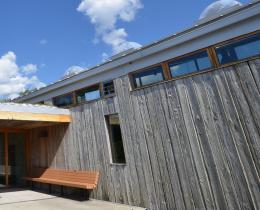With the catchy hashtag #Poughtential, the city of Poughkeepsie, New York, just 17 miles south of Omega, hosted their first Community Wealth-Building Summit in April. Omega’s CEO, Robert “Skip” Backus, spoke at the event as part of a panel on sourcing local food.
Community wealth building is an alternative approach to economic development. It is focused on inclusion, working collaboratively, local control and ownership of businesses, and building anchor institutions for long-term community benefit.
Poughkeepsie is home to many anchor institutions—nonprofits that, once established, tend not to move location—including five colleges, several hospitals, and the seat of the county government. Yet the city also faces enormous challenges. Nearly 1/3 of its residents live below the poverty line; nearly 1/3 of the downtown is vacant; and 1 in 4 households are food insecure.
The summit brought together more than 150 community stakeholders to talk about how Poughkeepsie’s anchor institutions could shift their spending to support and grow local businesses. Agriculture is a driving force behind the Hudson Valley’s economy—more than 5,000 largely family-owned and operated local farms have a gross economic impact of $810 million. At Omega, purchasing food grown in the Hudson Valley and reducing food waste are two important initiatives.
“We try to only buy things in season,” said Backus at the event. “For example, raspberries are available at a local supermarket year-round, but Omega is only serving them when they are growing locally…. We’ve also adjusted our menus to reduce food waste. The economics of buying local can be costly for nonprofits…. Defining sustainability and local purchasing requires a broad scope. It’s not just where food comes from, it’s how much energy and water was used, and thinking about the embedded carbon footprint when you are making purchasing decisions.”
With thousands of meals served each day across local anchor institutions, it is not possible to source all that’s needed from local farms, but every little bit helps.
“At Omega, we serve approximately 23,000 people per year. That’s about 700 meals, 3 times a day, beginning in May, when many of our local produce crops have not yet become available,” said Backus. “We are constantly adjusting to what is available and typically can find 60% locally. We have a staff member dedicated to researching vendors and helping us make the best purchase choices…. We would prefer to spend every dollar in the local market space, so this is an important area for regional conversation and cooperation,” concluded Backus.
The Community Wealth-Building Summit was a great place to start the conversation, helping key organizations in the Hudson Valley realize we have the opportunity—and #Poughtential—to address challenges no one organization can solve alone.



